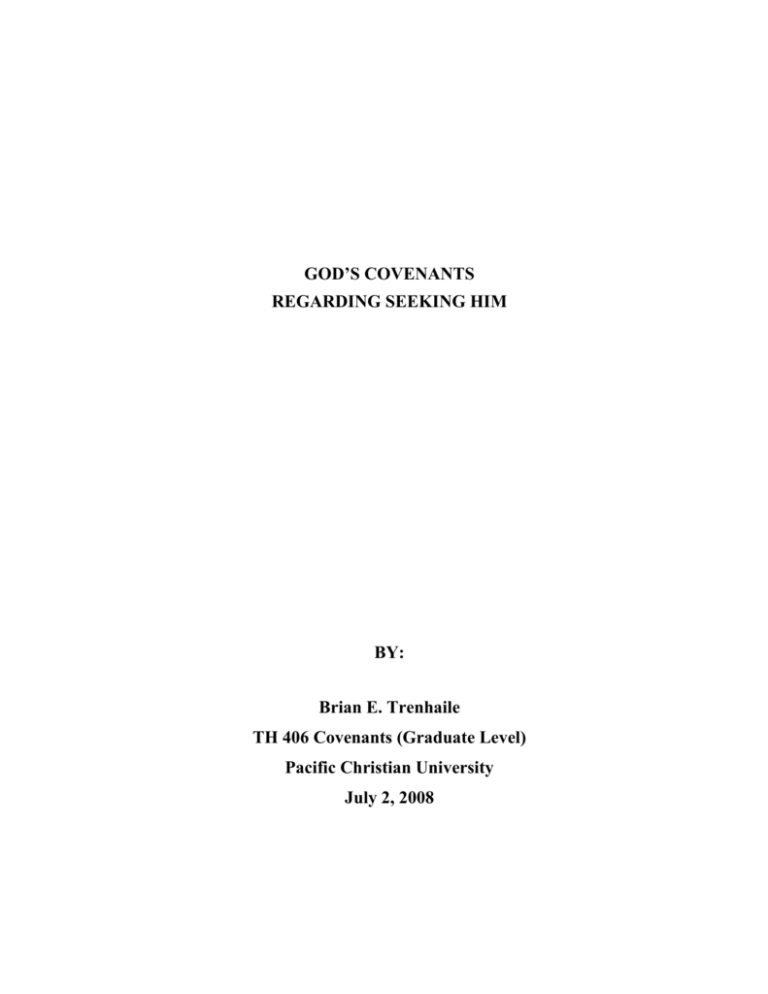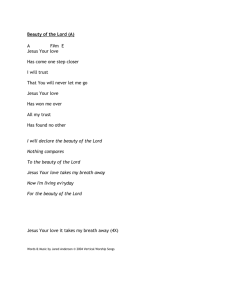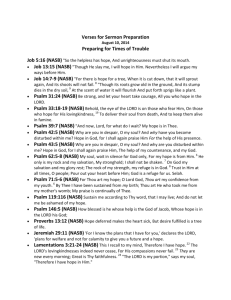
GOD’S COVENANTS
REGARDING SEEKING HIM
BY:
Brian E. Trenhaile
TH 406 Covenants (Graduate Level)
Pacific Christian University
July 2, 2008
TABLE OF CONTENTS
INTRODUCTION ................................................................................................................ 3
I.
Old Testament Examples .............................................................................................. 4
Blessings to Those Who Come to God ........................................................................ 4
Curses to Those Who Do not Seek God ....................................................................... 5
II.
New Testament Examples .......................................................................................... 5
Blessings to Those Who Come to God......................................................................... 5
Curses to Those Who Do not Seek God ....................................................................... 7
CONCLUSION ..................................................................................................................... 8
BIBLIOGRAPHY ................................................................................................................. 9
2
GOD’S COVENANTS REGARDING SEEKING HIM
INTRODUCTION
God makes covenants with those who seek Him. We were created for fellowship with
God,1 so it is logical that He would promise blessings to those who seek Him. God is consistent
in both the Old and New Testaments on this matter. He wants us to come to Him.
God desires it, so He speaks to us about His desire for our fellowship.2 In the following
quotation, look at all the blessings that He promises to those who come to Him.
God is an inviting God. … God is the King who prepares the palace, sets the
table, and invites His subjects to come in. In fact, it seems His favorite word is
“come.” “Come let us talk about these things. Though your sins are like scarlet,
they can be made white as snow.” “All you who are thirsty come and drink.”
God is a God who invites. God is a God who calls (Lucado, 174).
The wonderful promises that God makes are normally two sided. There is a human
responsibility side that cannot be ignored. A good definition follows, “Covenants are conditional
promises made to humanity by God” (Ahns 2). Some scriptural examples cited (Ahns 1) are:
“Know therefore that the Lord thy God, he is God, the faithful God, which keepeth covenant and
mercy with them that love him and keep his commandments” (Deuteronomy 7:9) and “And I
prayed unto the Lord my God, and made my confession, and said, O Lord, the great and dreadful
God, keeping the covenant and mercy to them that love him, and to them that keep his
commandments” (Daniel 9:4). Notice also that “Covenants had specific items that had promises
or curses .. rewards or penalties” (Ahns 6). This is God’s pattern; therefore it is also prevalent
throughout this presentation.
1
Earth is the reason for the universe, man is the reason for earth, and the Father heart of God is the reason for man
(cf. Keough 2).
2
“Eternal Life will meet the need of man and the heart cry of the Father for fellowship” (Kenyon 39).
3
I.
OLD TESTAMENT EXAMPLES
This section contains a sampling of promises that God made to those who came to Him
under the Old Covenant. These principles also apply to those who are under the New Covenant.
Blessings to Those Who Seek God
God promises to bless those who seek Him. One of these blessings is a relationship with
God, “I love those who love me; and those who diligently seek me will find me” (Proverbs 8:17,
NASB). Imagine that! We can have a relationship with the most loving and important being in
the universe. Daily believers can have summit meetings with the Most High. But, diligence is
needed to receive this promised blessing: “You will seek me and find me when you seek me with
all your heart” (Jeremiah 29:13, NIV). Some other conditions and wonderful promises are
contained in the following verse, “Then if my people who are called by my name will humble
themselves and pray and seek my face and turn from their wicked ways, I will hear from heaven
and will forgive their sins and restore their land” (II Chronicles 7:14).
In the following quote, about coming to God, Janet Fairbrother shares how Satan blocks
us and how God does the exact opposite.
Sometimes we bend our ear to the enemy who hates us and begin to focus on us:
our unworthiness, our frailty, our weaknesses. We allow condemnation to set in
and refuse to receive the grace and mercy our God wants to pour out on us …
Jeremiah 3 is a chapter that shows God’s emotion and deep longing for us to
come to Him for help. Hear His plea to His people in verses 11, 12, 19 and 22.
Return, faithless Israel, declares the Lord, I will frown on you no longer, for I am
merciful declares the Lord, I will not be angry forever. Only acknowledge your
guilt – You have rebelled against the Lord your God, You have scattered your
favors to foreign gods under every spreading tree, and have not obeyed me,
declares the Lord. I myself said, How gladly would I treat you like sons and give
you a desirable land, the most beautiful inheritance of any nation. I thought you
would call me ‘Father’ and not turn away from following me. Return, faithless
people; I will cure your backsliding … He not only says He will forgive us and be
merciful to us, but He also says He will not be angry; He will treat us like sons,
and He will cure us! All we need to do is acknowledge our sin and fall at His feet
… When we are lacking confidence before God, we are stuck in condemnation!
We must return to the simple truth that we are saved by grace and get our eyes off
4
us and back onto our Almighty God who loves us! Don’t let the enemy’s hate for
you convince you to live in condemnation. God’s love is crying out for you to
return to Him and receive His mercy and grace. Jesus has already paid the price
for your redemption (Fairbrother 1, 2).
Curses to Those Who Do Not Seek God
Deuteronomy 28 lists many of curses for those who do not come back to God. Great
suffering follows as a result of these curses. Among other things, this suffering includes
sickness, poverty, slavery and misery. Joshua also told the people the following:
And Joshua said unto the people, Ye cannot serve the LORD: for he is an holy
God; he is a jealous God; he will not forgive your transgressions nor your sins. If
ye forsake the LORD, and serve strange gods, then he will turn and do you hurt,
and consume you, after that he hath done you good (Joshua 24:19, 20).
II.
NEW TESTAMENT EXAMPLES
Similarities in the New Testament abound. When we diligently seek God, He promises
to reward us. The author of Hebrews said, “But without faith it is impossible to please him: for
he that cometh to God must believe that he is, and that he is a rewarder of them that diligently
seek him” (Hebrews 11:6). God left man with a conscience, so that man would seek Him. God
orders the affairs of men so that they seek Him and find him (cf. Kendall, 15, 16 & 19). The
following verse illustrates this fact. “His purpose was for the nations to seek after God and
perhaps feel their way toward him and find him—though he is not far from any one of us” (Acts
17:27).
Blessings to Those Who Seek God
The following words of Christ are full of wonderful promises to those who come to God.
Come to Me, all you who labor and are heavy-laden and overburdened, and I will
cause you to rest. [I will ease and relieve and refresh your souls.] Take My yoke
upon you and learn of Me, for I am gentle (meek) and humble (lowly) in heart,
and you will find rest (relief and ease and refreshment and recreation and blessed
quiet) for your souls. For My yoke is wholesome (useful, good--not harsh, hard,
5
sharp, or pressing, but comfortable, gracious, and pleasant), and My burden is
light and easy to be borne (Matthew 11:28-30).
Rest, mentoring, no degradation, gentleness, comfort, pleasant treatment, relief, ease,
refreshment, and blessed quiet are promised. But there is a condition. We must come to Him.
The context of this verse implies that we come to Him in times when we are busy and stressed.
Security, provisions, and fruitfulness are promised to those who come to God. Jesus
promised security when He said, “All that the Father gives Me will come to Me, and the one who
comes to Me I will certainly not cast out” (John 6:37 NASB). Jesus also promised provisions
when He said, “I am the bread of life; he who comes to Me will not hunger, and he who believes
in Me will never thirst” (John 6:35 NASB). On the Sermon on the Mount, Jesus said, “Seek ye
first … and food and clothing will be provided to you” (cf. Matthew 6:25-34). Fruitfulness is
also promised to those who have come to Him.
Jesus said, “Remain in me, and I will remain in you. For a branch cannot produce
fruit if it is severed from the vine, and you cannot be fruitful unless you remain in
me. ‘Yes, I am the vine; you are the branches. Those who remain in me, and I in
them, will produce much fruit. For apart from me you can do nothing (John 15:45 NLT).
There is also liberty for those who come to Jesus. The Bible says, “Whenever a person
turns to the Lord, the veil is taken away. Now the Lord is the Spirit, and where the Spirit of the
Lord is, there is liberty” (II Corinthians 3:16, 17).
Answered prayer is another benefit of coming to Him. Jesus said, “If you abide in Me,
and My words abide in you, ask whatever you wish, and it will be done for you” (John 15:7,
NASB). He also said, “For everyone who asks, receives; and he who seeks, finds; and to him
who knocks, it will be opened” (Luke 11:8-10, NASB). The only way you can ask, seek and
knock is by coming to God.
6
Christians have the privilege of coming before God as His ambassador. “Through Him
also we have [our] access (entrance, introduction) by faith into this grace (state of God's favor) in
which we [firmly and safely] stand. And let us rejoice and exult in our hope of experiencing and
enjoying the glory of God” (Romans 5:2, AMP). The reason He gave us this wonderful access is
so that we would come to Him.
When we come to Him in constant prayer, we will experience His peace. This is
wonderful peace that God lives in. This is God’s promise, “Be anxious for nothing, but in
everything by prayer and supplication with thanksgiving let your requests be made known to
God. And the peace of God, which surpasses all comprehension, will guard your hearts and your
minds in Christ Jesus” (Philippians 4:6, 7).
Curses to Those Who Do Not Seek God
Many blessings are conditional upon coming to Him. So if we do not come to Him, we
forfeit tremendous blessing. For example if we stop coming to Him, we open ourselves up to
severe trouble. Jesus said, “If anyone does not abide in Me, he is thrown away as a branch and
dries up; and they gather them, and cast them into the fire and they are burned” (John 15:6
NASB).
Those in the most danger are people who have never truly come to God, but they think
they have! Jesus said to the Pharisee’s, “You search the Scriptures because you think that in
them you have eternal life; it is these that testify about Me; and you are unwilling to come to Me
so that you may have life” (John 5:39-40, NASB). Jesus also had the following warning for
others in this same category.
Many will say to Me on that day, 'Lord, Lord, did we not prophesy in Your name,
and in Your name cast out demons, and in Your name perform many miracles?'
"And then I will declare to them, 'I never knew you; DEPART FROM ME, YOU
WHO PRACTICE LAWLESSNESS' (Matthew 7:22-23, NASB).
7
But, God loves mankind and definitely wants us to return to Him. This theme is
consistent throughout the Bible. In the New Testament God promises that He will fellowship
with us and also honor us when we come to Him. The Apostle James illustrates this concept in
the following verses.
Come close to God, and God will come close to you. Wash your hands, you
sinners; purify your hearts, for your loyalty is divided between God and the
world. Let there be tears for what you have done. Let there be sorrow and
deep grief. Let there be sadness instead of laughter, and gloom instead of joy.
Humble yourselves before the Lord, and he will lift you up in honor”
(James 4:8-10, NLT).
CONCLUSION
Awesome covenant blessings await those who come to God. A sampling of these
wonderful promises includes peace, refreshment, joy, liberty, answered prayer, fruitfulness,
salvation, security, provisions and healing from backsliding. These promises make sense
because they are tied into our original purpose of fellowshipping with God. But, to be blessed,
we need to remember, to fulfill our portion of covenants that God’s makes with us.
Besides “come,” there are other keywords associated with coming to God. These include
“return” and “seek.” Some of these words have slightly different meanings, but the end result is
the same; we have returned to our Maker. God loves us, but we need to come to Him so that we
can experience His full blessings. He does not ask us to come to Him so that He can lord it over
us. He asks us to come to Him so that we are in the proper place to be blessed.
We are created for fellowship with God. When we walk in this purpose we are content
and at peace. “You will guard him and keep him in perfect and constant peace whose mind [both
its inclination and its character] is stayed on You, because he commits himself to You, leans on
You, and hopes confidently in You” (Isaiah 26:3 AMP).
8
BIBLIOGRAPHY
Ahns, Sandra. Covenants – Teaching Syllabus & Study. Kaneohe, Hawaii: Pacific Christian
University, 2008.
Fairbrother, Janet. Return to Me, According to Your Faith Devotional. 3 pp. Albuquerque, New
Mexico: Fury of Faith Ministries, 2 June 2008.
Keough, Tammy. Lesson 1 – The Reason for Creation, Lecture Notes for TH-404 Plan of
Redemption, 5 pp. Kapolei, Hawaii: Pacific Christian University, 12 May 2008.
Kendall, R. T. Understanding Theology, Volume I. Fearn, Ross-Shire, UK: Christian Focus
Publications, 2002.
Kenyon, Edward. The Bible in Light of Our Redemption – Basic Bible Course. Lynnwood,
Washington: Kenyon’s Gospel Publishing Society, 1999.
Lucado, Max. Grace for the Moment, Volume I. Nashville, Tennessee: J. Countryman
Publishers, 2000.
Unless otherwise indicated, all scriptural quotations are from the King James Version of the
Bible.
Scripture references marked NKJV are taken from the NEW KING JAMES VERSION,
Copyright © 1979, 1980, 1982, by The Thomas Nelson, Inc. Used by permission. All
rights reserved.
Scripture references marked NASB are taken from the NEW AMERICAN STANDARD
BIBLE®, Copyright © 1960,1962,1963,1968,1971,1972,1973,1975,1977,1995 by The
Lockman Foundation. Used by permission.
Scripture quotations marked AMP are taken from the Amplified® Bible, Copyright © 1954,
1958, 1962, 1964, 1965, 1987 by The Lockman Foundation. Used by permission."
(www.Lockman.org).
Scripture references marked NIV are taken from the HOLY BIBLE, NEW INTERNATIONAL
VERSION ®. NIV ®. Copyright © 1973, 1978, 1984 by the International Bible Society.
Used by permission of Zondervan Publishing House. All rights reserved.
Scripture references marked NLT are taken from the NEW LIVING TRANSLATION ®. NLT
®. Copyright © 1996, 2004 by the Tyndale Charitable Trust. Used by permission of
Tyndale House Publishers. All rights reserved.
9











